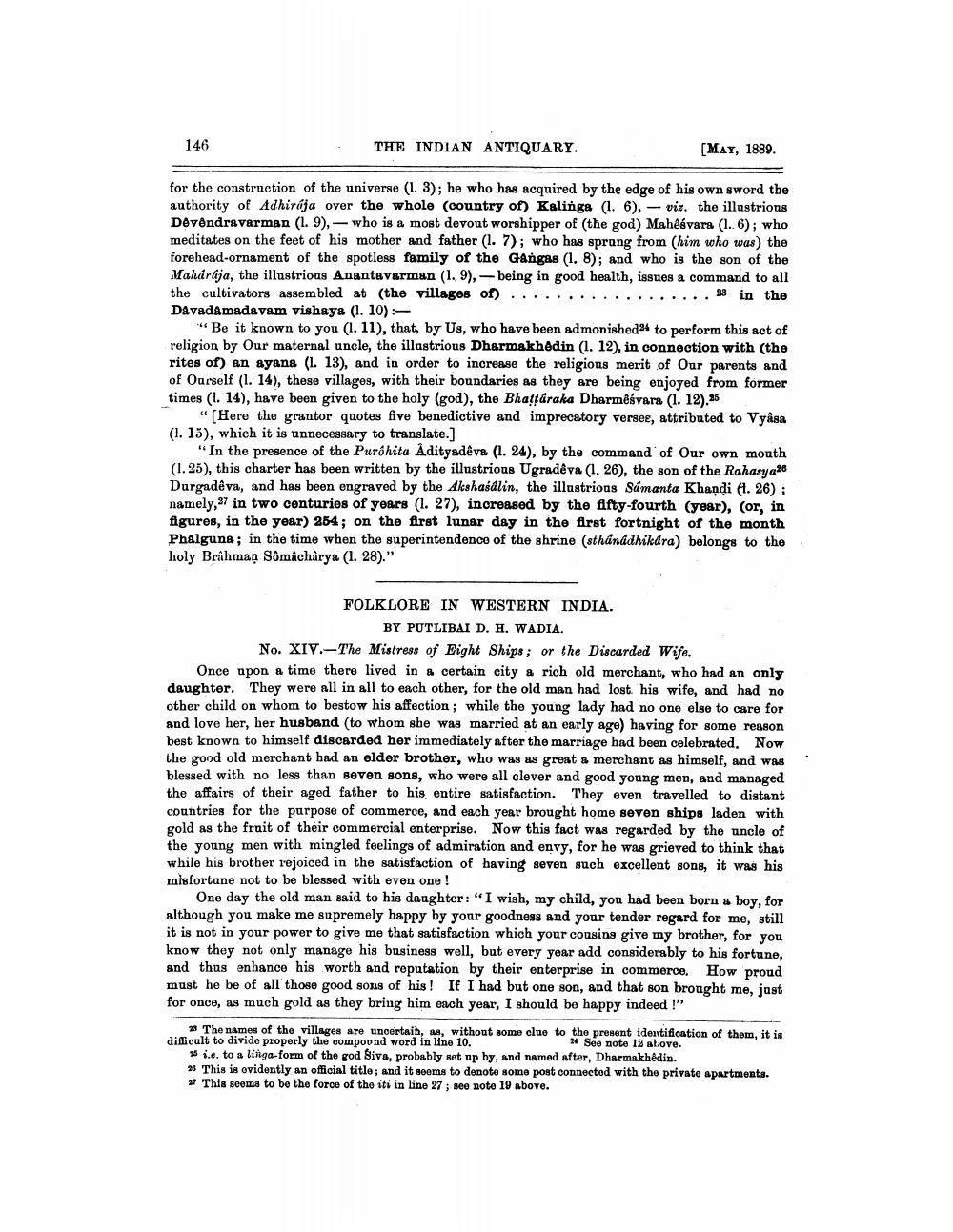________________
146
THE INDIAN ANTIQUARY.
[MAY, 1889.
for the construction of the universe (1.3); he who has acquired by the edge of his own sword the authority of Adhiraja over the whole (country of) Kalinga (1. 6), - viz. the illustrions Dovôndravarman (1. 9), - who is a most devout worshipper of (the god) Mahêávara (1..6); who meditates on the feet of his mother and father (1. 7); who has sprang from him who was) the forehead-ornament of the spotless family of the Gangas (1. 8); and who is the son of the Mahiraja, the illustrious Anantavarman (1.9), - being in good health, issues a command to all the cultivators assembled at (the villages of).................. 33 in the Davadamadavam vishaya (1. 10) -
*Be it known to you (1. 11), that, by Us, who have been admonished 24 to perform this act of religion by Our maternal uncle, the illustrious Dharmakhedin (1. 12), in connection with (the rites of) an syana (1. 13), and in order to increase the religious merit of Our parents and of Ourself (1. 14), these villages, with their boundaries as they are being enjoyed from former times (1. 14), have been given to the holy (god), the Bhattáraka Dharmêsvara (1. 12).25
" (Here the grantor quotes five benedictive and imprecatory versee, attributed to Vyasa (1. 15), which it is unnecessary to translate.]
"In the presence of the Purðhita Adityadêva (1. 24), by the command of Our own mouth (1.25), this charter has been written by the illustrious Ugradêva (1. 26), the son of the Rahasya 26 Durgadêva, and has been engraved by the Akshasálin, the illustrious Súmanta Khandi (1.26) ; namely, 37 in two centuries of years (1. 27), increased by the fifty-fourth (year), (or, in figures, in the year) 254; on the first lunar day in the first fortnight of the month Phalguna; in the time when the superintendence of the shrine (sthánádhikdra) belongs to the holy Brahman Sômacharya (1. 28)."
FOLKLORE IN WESTERN INDIA.
BY PUTLIBAI D. H. WADIA. No. XIV.-The Mistress of Eight Ships; or the Discarded Wife. Once upon a time there lived in a certain city a rich old merchant, who had an only daughter. They were all in all to each other, for the old man had lost his wife, and had no other child on whom to bestow his affection; while the young lady had no one else to care for and love her, her husband (to whom she was married at an early age) having for some reason best known to himself discarded her immediately after the marriage had been celebrated. Now the good old merchant had an elder brother, who was as great a merchant as himself, and was blessed with no less than sovon sons, who were all clever and good young men, and managed the affairs of their aged father to his entire satisfaction. They even travelled to distant countries for the purpose of commerce, and each year brought home seven ships laden with gold as the fruit of their commercial enterprise. Now this fact was regarded by the uncle of the young men with mingled feelings of admiration and envy, for he was grieved to think that while his brother rejoiced in the satisfaction of having seven such excellent sons, it was his misfortune not to be blessed with even one!
One day the old man said to his daughter: "I wish, my child, you had been born a boy, for although you make me supremely happy by your goodness and your tender regard for me, still it is not in your power to give me that satisfaction which your cousing give my brother, for you know they not only manage his business well, but every year add considerably to his fortune, and thus enhance his worth and reputation by their enterprise in commerce. How proud must he be of all those good sons of his! If I had but one son, and that son brought me, just for once, as much gold as they bring him each year, I should be happy indeed !"
13 The names of the villages are uncertain, as, without some clue to the present identification of them, it is difficult to divide properly the compovad word in line 10.
24 See note 12 atove. 35 i.e. to a linga-form of the god Siva, probably set up by, and named after, Dharmakhedin. * This is ovidently an official titlo; and it seems to denote some post connected with the privato apartments. 21 This seems to be the force of the iti in line 27; see note 19 above.




